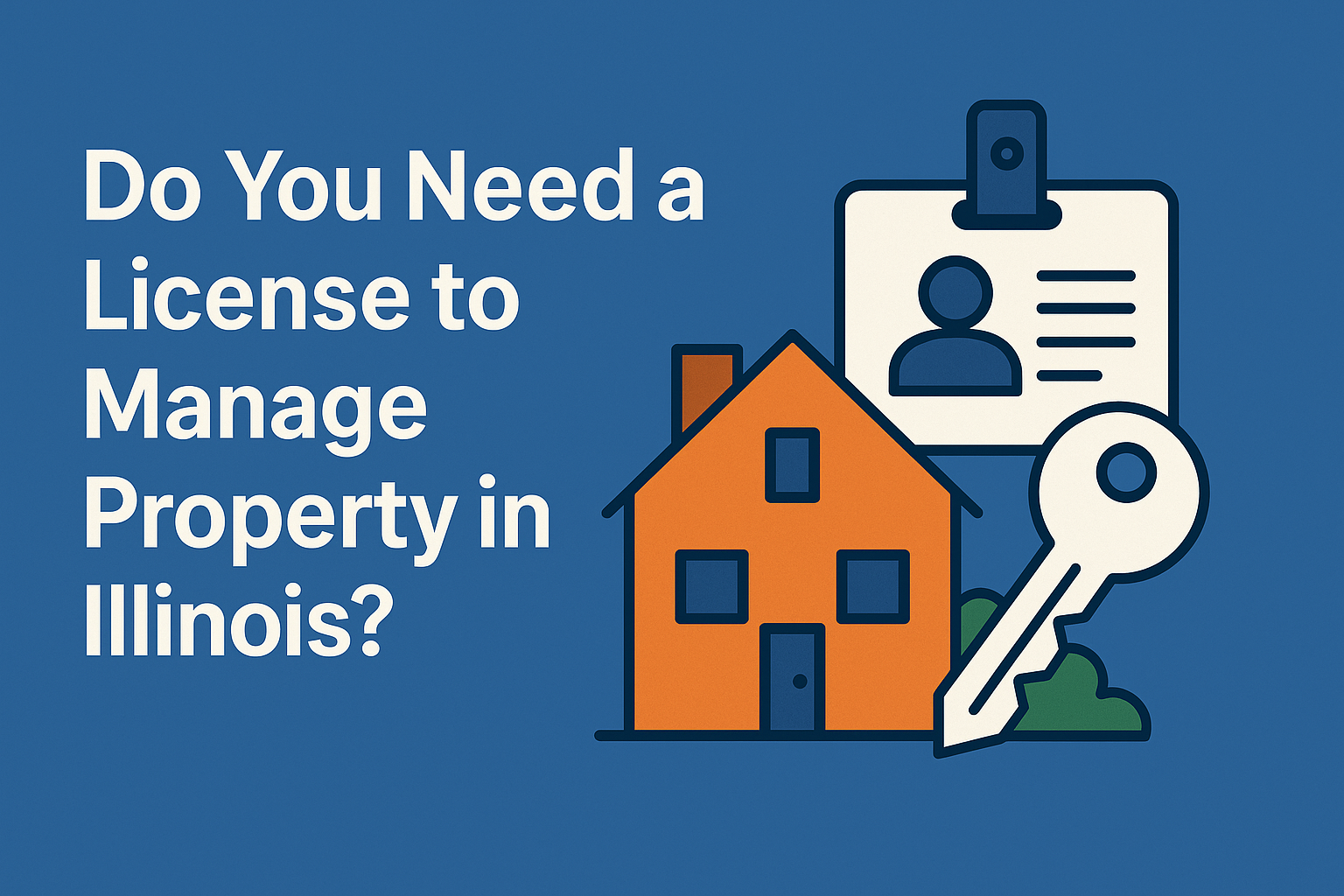Disclaimer: I’m not an attorney; this blog is for informational purposes only. Laws and requirements can change, so if you’re serious about getting licensed or need legal or regulatory advice, check the latest information from the Illinois Department of Financial and Professional Regulation (IDFPR) or consult a qualified professional.
Wondering if the property manager you’re hiring in Illinois needs a license? In most cases, the answer is yes, and checking their credentials can save you from severe legal and financial headaches. First, let’s clear up a common misconception: there’s no such thing as a “property management license” in Illinois. Instead, property managers must hold a real estate broker license. If someone has a Residential Leasing Agent License, that person can perform a limited property management function.
Why Illinois Puts Property Management Under “Brokerage”
The Illinois Real Estate License Act casts a wide net. If you lease space, collect rent, market units, or negotiate terms for someone else and get paid, the state calls that real‑estate brokerage. Translation: Property managers need a license unless they fit one of a few narrow carve-outs.
Two Easy Paths to Stay Legit
1. Residential Leasing Agent
Show units, process applications, and sign residential leases under a sponsoring broker.
15 hours of pre-license class + the state exam.
Annual renewal with 8 hours of continuing education every two years.
Perfect for on-site leasing staff or assistants who only handle the front-end leasing work.
2. Real Estate Broker
Full soup‑to‑nuts management: leasing, rent collection, vendor wrangling, owner reports—you name it.
With the real estate broker license, the broker can also act as an agent to help clients buy or sell properties, just like any other licensed real estate agent.
75 hours of pre-licensing + 15 interactive hours, then the state exam, plus 30 post-licensing hours in your first renewal cycle.
Ongoing: 12 hours of CE every two years (6 core, 6 elective, increased fair-housing content starting in 2025).
Ideal for independent property managers, portfolio owners managing for others, or anyone leading a team.
Illinois scrapped the old “salesperson” category, so broker is the go-to credential if you want to steer your own ship.
When You Can Skip the License
You’re off the hook if you:
Only manage property you own.
Work as a salaried on-site employee for a single owner (think apartment concierge), and you won’t negotiate lease terms for multiple owners.
Act under a court appointment (executor, receiver, trustee).
Step outside those lines—like collecting commission—and you’re back in licensing territory.
How to Verify a Property Manager’s License
Before signing a management agreement, take a moment to confirm the license status of the person or company you’re considering:
Visit the Illinois Department of Financial and Professional Regulation (IDFPR) website: idfpr.illinois.gov.
Click “License Lookup” from the homepage under the “Licensees” menu.
You’ll be taken to the License Lookup portal. Enter the property manager’s name, company name, or license number.
Look for:
An active status (not expired or inactive).
A licensed real estate broker or residential leasing agent.
Any disciplinary actions or notes under the license record.
If the license is missing, inactive, or not tied to the right category, that’s a signal to pause and ask more questions.
What’s New for 2025
All property‑management agreements must be in writing—handshakes no longer cut it.
Fair‑housing training is now baked into the core CE bundle.
IDFPR has amped enforcement: unlicensed activity can cost you up to $25,000 per violation (plus a cease‑and‑desist order).
Quick‑Start Checklist to Get Licensed
Pick an IDFPR-approved school and finish your pre-license hours.
Create an IDFPR portal account and schedule the PSI exam.
Pass the test, submit your application, and link up with a sponsoring broker (or become a managing broker yourself).
Set up your compliance essentials—E&O insurance, trust‑account bookkeeping, and a written policy manual.
Mark your CE and renewal deadlines on the calendar so nothing slips through the cracks.
Bottom Line
If you’re collecting rent or writing leases for anyone other than yourself, a license isn’t optional—it’s the cost of doing business in Illinois. As a rental property owner, you want to work with a credentialed, compliant manager who is ready to protect your investment. Always verify their license before handing over the keys.
Play by the rules, stay organized, and let the resident experience be the only thing that keeps you up at night.


